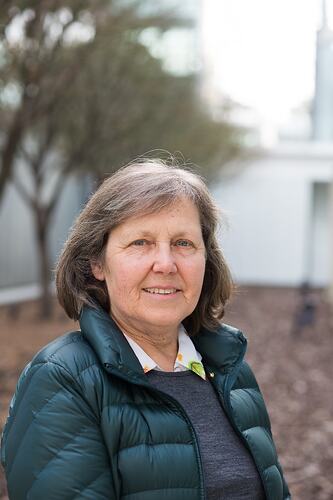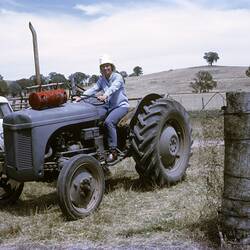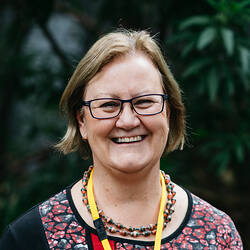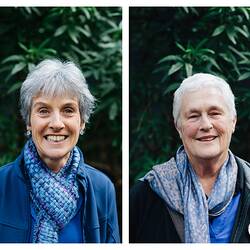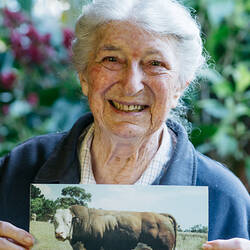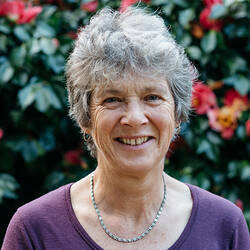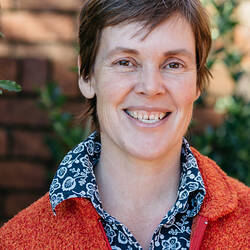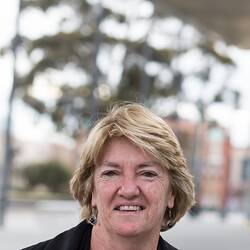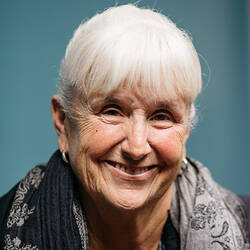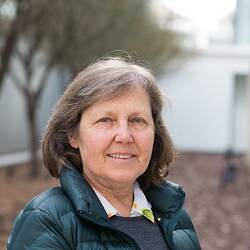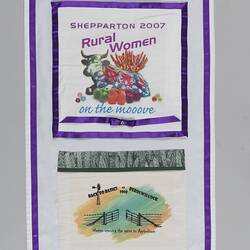Valerie Lang contributed significantly to the Rural Women's Movement of the 1980s-1990s and won an Order of Australia for service to women living in rural and regional communities, particularly by improving social and economic conditions through the Foundation for Australian Agricultural Women, and to the environment, health and education.
The following excerpts were taken from an interview with Valerie Lang, recorded by Invisible Farmer Project Curator Catherine Forge at Melbourne Museum on 8 September 2015.
When did you first become involved with agriculture and farming?
My family spent quite a lot of time outdoors, not in farming. But when I was in middle school I had a very good friend who came from a town at Bordertown and I used to visit her farm for holidays. It had a very large effect on me. I was interested in nature and natural history, and was a strong science student, so I ended up deciding to do practical science and chose Agriculture, which was very much related to having spent so much time on that wheat and sheep farm.
Can you remember what it is about the farm that you enjoyed in those teenage years?
I think the fact that we were actually allowed to be part of it. We would get up really early in the morning and go outside and move the sheep and do whatever needed to be done - things like weeding, chopping out weeds or digging holes and land marking, things like that.
You mentioned you ended up deciding to study Agriculture. What led you to this decision?
I had actually applied for, and got into, Science and I didn't realise you could do Agricultural Science. The day I went to enrol I walked past the desk that said 'Agricultural Science', and I asked if I could change that on my application, and they said yes. So that was at Melbourne University, and the interesting thing is that in those days girls couldn't do practical studies at Dookie, or Longerenong, or Marcus Oldham - that was only for boys. There weren't nearly as many women then. By the time we finished there were four or five girls to forty boys.
How did these gender limitations impact on your studies?
What was interesting about Agriculture is that everyone did the same subjects, every year, so you got to know people very well. It was a very close group. After a short time it didn't really matter if you were a boy or a girl. But to start with there wasn't many women applying. Overall though, my education was amazing, not just career-wise, but also because you did such a wide range of subjects - like Geology and Economics - so it was a really good overview, and I hope I appreciated every moment when I was there.
How did you find yourself getting involved with the Rural Women's Movement of the 1980s-1990s?
I went travelling overseas with my husband, who actually studied in the same year as I had at University, but he was just a friend then. When we got home from overseas we went to the family farm, where his family were, and I got pregnant and worked for a year at a local school and had several children. During that time I got to know some of the local women in the community, and we started discussing things that we thought were lacking in our rural community, and one of those things was community education. Someone found an advertisement for Rural Women's Access grants, and we applied for that and ended up employing someone and running workshops on all sorts of things, such as AIDS. During this time, in a parallel universe, the Rural Women's Network was forming, and because we'd had one of these Rural Access grants, they made contact with us. So we then started to hook in with bigger networks, such as the Rural Women's Network. Not long after that the first Women on Farms Gathering was held in Gippsland, and I got involved on the committee of a rural women's group at Glenormiston, and helped organise the Glenormiston Women on Farms Gathering in 1994. So we went from having a local project to being linked up regionally, and across the state, and it was a very easy system to work in. During the same year that I was involved with Glenormiston they also had the first International Rural Women's Conference in Melbourne, so I was linked up with that too, but not running it. I also joined the Australian Women in Agriculture, and was a quiet member of that. I then went onto the Board of the Foundation for Australian Agricultural Women (FAAW) and after several years I became the President which was exciting. As well as that the State Government had the Rural Women's Network, which was a very good contact network. It supported you if you wanted to run things or needed training. They sort of pointed you in the right direction, and they had an amazing newsletter, NETWORK, that provided the most extraordinary way to hear women's stories and see what other people were doing in their rural communities. They had an advisory group for the Rural Women's Network and I was involved in that too. I did feel at times that we were influencing the agenda, which is pretty amazing.
How did you influence the Agenda?
I think in two ways. One is that we had a voice as a collective group of women, and there were people in the state departments who would listen to you. Frank McClelland, for example, who was in the Office of Rural Affairs, would certainly listen to you. People in positions of authority respected you and put time into supporting you and listening. Another way we've influenced politics is that when the Australian Women in Agriculture (AWiA) speak to politicians, we don't have specific policies per se, but we ask members if they have issues and we prepare an issues paper. One of the key messages of AWiA is that women be recognised for their contributions to agriculture, and AWiA has provided an opportunity to develop your skills, contribute to papers - say the White Paper - and to hear other women's stories.
How culturally diverse was the Rural Women's Movement? Did you work alongside, for example, Indigenous Women?
I recall working with Leann Wilson and she was amazing. She actually became the second President of the National Rural Women's Coalition and took us to all sorts of places, Indigenous places that we wouldn't have otherwise have the opportunity to go to. She made it her duty I think to culturally immerse us. So we went to visit some of her sacred ground, and she would tell us if we were using language that wasn't the most helpful, and ways to be more conscious and aware of Indigenous issues. So we were very lucky - there were certainly some extraordinary women out there. Earlier this month we also had a Women in Agriculture conference in Alice Springs, and there were quite a number of Indigenous women there - I mean, you weren't really noticing who was indigenous or non-indigenous and it was very inclusive.
One of the issues with farming in Australia is the popular myth that women don't farm, despite the reality that they do - can you reflect on that?
I was reading in a recent newspaper that they were doing a poll on the wool industry, and they kept referring to 'fourth generation farmer' or 'fifth generation farmer'. That's a very traditional approach, because it's quite hard to have fourth or fifth generation female farmers (due to farm succession and patrilineal farm inheritance). But things are slowly changing. When I studied and went to Melbourne University and wasn't allowed to go to Dookie or Longerenong, for example, I just went along with it. If you said to any of my daughter's friends, 'you can't go there, you're not allowed', they would kick up a fuss and picket the place.
More Information
-
Keywords
Agriculture, Farming, Rural Women, Rural Industry, Rural Victoria, Women's Associations, Conservation, Sustainable Agriculture, Women's Movement, Gender Roles
-
Localities
-
Authors
-
Contributors
-
Article types
